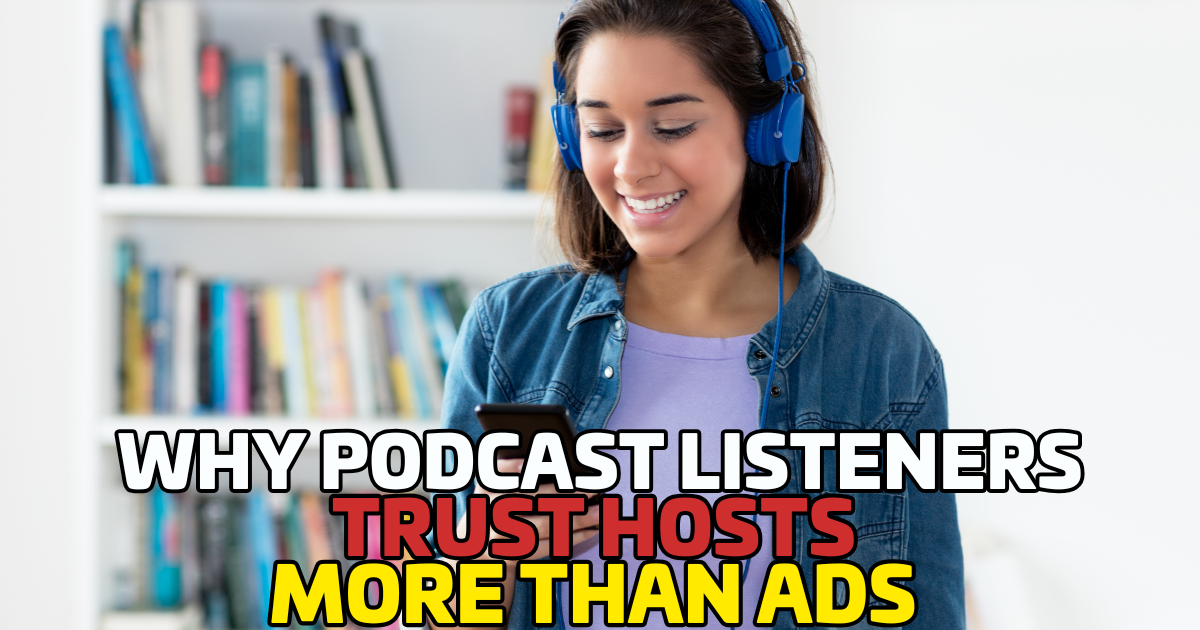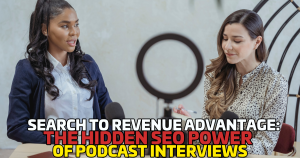Podcasting has carved out a powerful space in the media landscape, one marked by intimacy, trust, and deep audience engagement.
While ads remain essential for monetization, data shows that listeners tend to trust podcast hosts much more than traditional or interruptive advertisements.
For brands, professionals, and advocates, this shift has major implications.
In this article, we’ll dive into the research, explore why trust is higher for hosts, compare host-read endorsements vs. traditional ads, and show how to harness this trust without compromising authenticity.
For broader context on podcasting trends and listener behavior, you may want to refer to Podcast Statistics 2025 and Why It Matters for Professionals, Business Owners & Advocates.
Why Trust Matters in Podcasting
Trust isn’t just a “nice to have”, it’s a foundational asset.
Brands that earn listener trust enjoy higher retention, better conversion, greater loyalty, and more word-of-mouth.
When listeners believe in the host, recommendations (or even products sponsored by the host) carry more weight, often equaling those made by friends or family.
Data shows some powerful numbers:
- 63% of listeners say their podcast hosts are trustworthy. lifestyleandtech.co.za+1
- 80% say they trust product recommendations from hosts. lifestyleandtech.co.za+2Acast+2
- In comparison, podcast ads are more effective and more memorable in podcast environments than in many other media spaces. Acast+3ads.spotify.com+3adtonos.com+3
Given these statistics, it’s clear that listeners form special bonds with hosts, bonds that are harder for generic ads to replicate.
What the Data Says: Key Findings
To understand why podcast listeners trust hosts more than ads, let’s look deeper into the data.
| Finding | Source / Statistic | What It Tells Us |
| High trust in hosts | ~63% of listeners deem their podcast hosts trustworthy; ~80% trust their product recommendations. lifestyleandtech.co.za+2Podcast Advertising Worldwide+2 | A large majority believe hosts are credible and their recommendations are meaningful. |
| Authenticity & transparency | ~70% of listeners value authenticity and transparency from their favorite creators. SiriusXM Media+1 | Authenticity is a core component of host trust. Hosts who are open, candid, perhaps even imperfect, tend to win loyalty. |
| Better recall & action | Many listeners remember or act on host-read ads more than typical ads. Spotify found 58% say they remember podcast ads because of their engagement. ads.spotify.com Also, studies show that podcast ads are less skipped and more likely to influence purchase decisions. Acast+2ads.spotify.com+2 | Listeners aren’t just listening—they’re absorbing, remembering, and often taking action. |
| Parasocial relationships | Audiences often feel personal connection to the host; sense that the host “knows” them. 65% of listeners feel a personal connection; host-listener relationships build loyalty. Deloitte+3SiriusXM Media+3The Podcast Exchange (TPX)+3 | These one-sided yet emotionally real relationships (parasocial) give hosts credibility that ads by brands alone seldom have. |
| Less resistance to host-read / host-endorsed ads | Host-read ads are often seen as more authentic and natural vs. traditional ads. Listeners are more accepting of sponsor messages when the host is involved. adtonos.com+3Podcast Advertising Worldwide+3The Podcast Exchange (TPX)+3 | This is key: when a trusted host endorses, the message tends not to be perceived as “selling,” but more like a recommendation. |
Why Hosts Are More Trusted Than Ads: The Underlying Mechanisms
From the findings above, several drivers emerge that explain why hosts are more trusted than ads.
Understanding these can help brands and creators use trust effectively and sustainably.
- Authenticity & Voice
Hosts speak in a more personal, unscripted or semi-scripted way. They share their own stories, opinions, even vulnerabilities.
That human voice is much harder to replicate in polished, brand-only ads. Listeners perceive hosts as individuals, not just broadcasters.
- Consistency Over Time
Hosts appear episode after episode, often following a schedule. Over time, listeners become familiar, build routines, and form habits around listening.
That familiarity breeds trust. In contrast, standard ads are often fleeting, changing, or appear inconsistent.
- Parasocial Bonds
As noted, listeners often feel a kind of connection to the host, like the host is speaking just to them.
While they may never meet them in person, the repeated exposure, voice, point of view gives a sense of friendship or mentorship.
- Curated Content & Relevance
Listeners choose which podcasts to listen to. That means their trust is already somewhat earned, podcasts tend to be niche, topic-aligned, interest-aligned.
When a host aligns with listeners’ interests, values, or identity, trust is reinforced.
- Native, Less Disruptive Advertising
Host-read ads often integrate smoothly into episodes, rather than feeling like an abrupt interruption.
Because the host is “in the conversation,” endorsement or ad feels more like a recommendation from someone the listener already cares about.
- Transparency & Disclosure
Good hosts and podcasters tend to be transparent about partnerships, sponsorships, and whether they really believe in what they promote.
That transparency avoids feelings of manipulation.
How Trust Shifts Benefits to Brands and Professionals
When hosts are trusted more, brands/advocates/professionals can leverage these trust advantages in multiple ways:
- Higher conversion rates: Because listeners are more likely to believe host recommendations, ads from hosts tend to convert better.
- Better recall & brand memory: Engaged listeners remember sponsor messages more clearly.
- Improved brand perception: Being associated with a trusted host can lift brand credibility.
- More loyal customers: Audiences reached via trusted hosts tend to have stronger loyalty.
Additionally, trust can allow for premium pricing in sponsorships, better ROI, and more effective long-term brand building (not just short-term sales).
Comparing Host-Read vs Traditional Ads: Pros, Cons, and Data
Let’s contrast host-read / host-endorsed messages with more standard ad formats.
| Feature | Host-Read / Host-Endorsed Ads | Traditional / Brand-Only Ads |
| Perceived authenticity | High—listeners often believe the host genuinely uses or vetted the product. Supported by data: many listeners trust host-read ads more. adtonos.com+3Acast+3Acast+3 | Lower—often seen as “just advertising,” less personal, more polished or distant. |
| Listener attention & recall | Higher; host voice, endorsement, trust boost attention and memory. ads.spotify.com+2Agility PR Solutions+2 | Lower; more likely to be skipped or tuned out. |
| Resistance / Ad fatigue | Less resistance if the host is trusted; listeners are more forgiving. | Greater resistance; more ad-skipping, less trust. |
| Suitability for certain audiences | Strong when the audience is niche, engaged, loyal; for professionals, advocates, or subject matter experts. | Better for wide awareness, but risk of disconnect with the audience if messaging seems generic. |
| Cost / production | Host-read can require coordinating host, aligning sponsorships, potentially limiting volume. | Easier to scale, more controllable, perhaps cheaper to produce more generic ads. |
What the Risks / Pitfalls Are
Trust is powerful, but fragile. Misusing it can backfire. Here are some caveats:
- If a host promotes something they don’t believe in, listeners may feel betrayed.
- Over-commercialization (too many ads or frequent sponsor mentions) can erode authenticity.
- Poor alignment between host’s values and brand’s values can damage both reputations.
- Lack of disclosure or transparency can lead to distrust or even regulatory issues in some markets.
How Brands and Hosts Can Build & Sustain Trust
Given all of the above, what should brands, professionals, and advocates do to maximize the trust advantage of host relationships?
- Choose Hosts Who Align with Your Values & Audience
Don’t just pick popular shows, look for host credibility, audience trust, content relevance. - Encourage Authentic, Genuine Endorsements
Allow the host to test, use, share honest opinions. Personalized stories or testimonials can move the needle. - Maintain Transparency
Always disclose relationships. Make clear when sponsorships are in place vs when content is editorial. - Limit Ad Load & Preserve the Listener Experience
Don’t overload with ads. Ensure sponsorships feel integrated, not disruptive. - Leverage Data & Feedback
Use listener feedback, ratings, reviews. Monitor performance of host read ads vs standard ads. Refine based on what feels authentic. - Consistency Over Time
Trust builds gradually. Long-term partnerships, frequent presence, consistent messaging help more than one-off campaigns.
Case Examples & Stats You Can Use
Here are some compelling data points that show trust works in practice:
- 77% of listeners trust host recommendations. Acast
- 63% of people say their podcast host is trustworthy. Acast+2lifestyleandtech.co.za+2
- 80% say they trust what host recommends. lifestyleandtech.co.za+2Podcast Advertising Worldwide+2
- 65% feel personal connection to host; many more say the host feels more authentic than what they see on social media. SiriusXM Media+2The Podcast Exchange (TPX)+2
- 70% or more rate authenticity and transparency as highly important in their favoritism of creators/hosts. SiriusXM Media+1
These stats are strong support for strategies that emphasize host involvement, clear endorsement, and relationship building.
Internal Link / Broader Context
For more on how podcasting as a medium is growing overall, what listeners’ behaviors are, and why that matters to business owners, professionals, and advocates, see our deeper dive: Podcast Statistics 2025 and Why It Matters for Professionals, Business Owners & Advocates.
This helps in understanding how big the opportunity is, and what levers to pull.
What This Means for Professionals, Business Owners & Advocates
If you are someone building a personal brand, running a business, or advocating for a cause, here are specific implications:
- Leverage Podcast Guesting or Hosting: Being the trusted voice (host or guest) gives you direct access to audiences who are already predisposed to trust hosts more.
- Invest in Content that Builds Relationships: Not just sales-driven messages, but stories, authenticity, vulnerability.
- Combine Ads with Host Prominence: If doing ads, have hosts voice them, not just inserted spots.
- Measure More Than Reach: Track not just downloads or listens, but conversion, sentiment, trust metrics (surveys, reviews).
- Use Trust to Enable Premium Pricing: Trusted endorsements allow you to command higher rates (for sponsorships or product pricing), because the value is in credibility.
The data is clear: podcast hosts carry unique assets that traditional ads cannot easily replicate, authenticity, consistency, personal connection, and trust.
When listeners feel they know, like, and respect a host, recommendations and sponsor messages from that host gain efficacy far beyond what many generic ads achieve.
To succeed in modern podcast advertising or brand building, it’s not enough to simply pay for ad space.
The most effective strategies are those that tap into the host-listener bond, preserve authenticity, and put listener trust at the center.
Would you like to harness this powerful trust advantage for your brand or voice?
Let’s work together. At Command Your Brand, we help founders, professionals, and advocates craft podcast strategies, secure host-led endorsements, and build trustworthy audio presences that multiply influence and impact.
Apply for a Strategy Session to discover how you can turn host trust into loyal audiences, meaningful engagement, and measurable growth.




